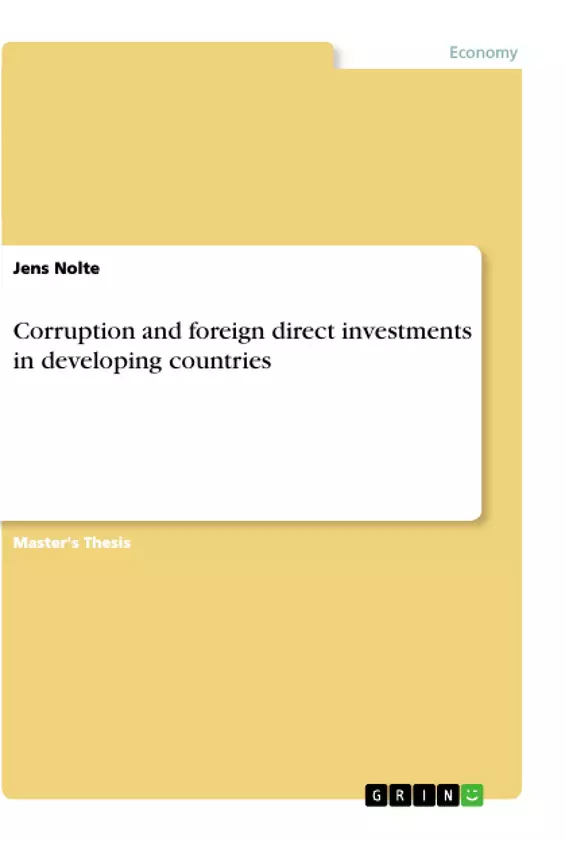Corruption is generally accepted as a phenomenon which is occurring worldwide. Nevertheless, the data which is quantifying its manifestation showcase geographical as well as cultural differences. Unscrupulous governments, non existing economic prosperity, a high degree of political instability and a population deeply afflicted by poverty are the most conspicuous explanations for elevated levels of corruption.
This Thesis explores the nexus between corruption and FDI especially in developing and 3rd world countries.
Consequently, the aim of this thesis is to analyze the interplay between corruption and FDI inflows. The principal question is hereby under which circumstances investors seem to "overlook" potential grievances in the recipient countries and which effect el-evated FDI inflows have on the prosperity of the beneficiary economy. By exploring the repercussions FDI has on economic growth, in the further course and in a separate section, the thesis devotes special attention to developing countries.
Inhaltsverzeichnis (Table of Contents)
- 1. INTRODUCTION
- 2. CORRUPTION
- 2.1 DEFINITION OF CORRUPTION.
- 2.2 FORMS OF CORRUPTION.
- 2.3 PSYCHOLOGY BEHIND CORRUPTION.
- 2.4 MEASURING CORRUPTION....
- 2.4.1 LIMITATIONS OF MEASUREMENTS OF CORRUPTION.
- 2.4.2 MAGNITUDE OF CORRUPTION
- 2.5 CAUSES OF CORRUPTION
- 2.5.1 NATURAL RESOURCE ENDOWMENT
- 2.5.2 SHADOW ECONOMY..
- 2.5.3 WAGES....
- 2.5.4 TRANSPARENCY AND FREEDOM OF THE PRESS.
- 2.5.5 POLITICAL COMPETITION AND FREE MARKET.
- 2.5.6 HISTORICAL BACKGROUND (PRIMARILY COLONIAL)
- 2.5.7 GENDER...
- 2.5.8 RELIGION.
- 2.5.9 MIGRATION.
- 2.6 CORRUPTION AND ECONOMIC GROWTH.
- 2.7 CORRUPTION AND ITS EFFECT ON FIRMS.
- 2.8 CORRUPTION AND ITS CONSEQUENCES IN DEVELOPING COUNTRIES
- 2.9 FIGHTING CORRUPTION
- 3. FOREIGN DIRECT INVESTMENT
- 3.1 DEFINITION AND A HISTORICAL PERSPECTIVE OF FDI.
- 3.2 FORMS OF FDI....
- 3.3 MOTIVES FOR FDI
- 3.4 FDI AND GROWTH.
- 3.4.1 CROWDING OUT.
- 3.4.2 CROWDING IN.
- 3.5 POVERTY REDUCTION THROUGH EXTERNAL CHANNELS.
- 3.6 IMPORTANCE OF FDI IN DEVELOPING COUNTRIES.
- 3.7 FDI IN NUMBERS
- 4. NEXUS BETWEEN FDI AND CORRUPTION
Zielsetzung und Themenschwerpunkte (Objectives and Key Themes)
This master's thesis delves into the complex relationship between corruption and foreign direct investments (FDI) in developing countries. The study aims to analyze the impact of corruption on FDI inflows, examine the motivations behind FDI in corrupt environments, and explore potential strategies for mitigating the negative effects of corruption on economic development.
- The definition, forms, and measurement of corruption.
- The various causes of corruption and its consequences for economic growth and development.
- The nature of FDI, its motivations, and its role in promoting economic growth and poverty reduction.
- The intricate connection between corruption and FDI, examining both the negative and potentially positive effects.
- Strategies for combating corruption and fostering a more conducive environment for FDI in developing countries.
Zusammenfassung der Kapitel (Chapter Summaries)
- Chapter 1: Introduction
- Chapter 2: Corruption
- Chapter 3: Foreign Direct Investment
- Chapter 4: Nexus between FDI and Corruption
This chapter provides a general overview of the topic of corruption and its impact on economic development, emphasizing the importance of understanding the relationship between corruption and FDI for sustainable growth in developing countries.
This chapter defines corruption, exploring its various forms and underlying psychology. It further delves into methods for measuring corruption, its causes, and its consequences for economic growth and firms. Finally, it discusses strategies for combating corruption.
This chapter defines FDI, examining its historical evolution and various forms. It explores the motivations behind FDI, its relationship with economic growth, and its potential for poverty reduction. The chapter also provides insights into the importance of FDI for developing countries and presents statistical data on FDI inflows and outflows.
This chapter explores the complex relationship between FDI and corruption, analyzing both the negative and potentially positive effects of corruption on FDI inflows. It examines how corruption can hinder FDI by increasing uncertainty and risks for investors, while also discussing situations where corruption might facilitate FDI under specific circumstances.
Schlüsselwörter (Keywords)
The central themes and concepts explored in this thesis include corruption, foreign direct investment, developing countries, economic growth, institutional economics, governance, transparency, accountability, and sustainable development.
Frequently Asked Questions
What is the main focus of this thesis regarding corruption and FDI?
The thesis explores the nexus between corruption levels and Foreign Direct Investment (FDI) inflows, specifically in developing and third-world countries.
What are the common causes of elevated corruption in developing nations?
Key factors include unscrupulous governments, lack of economic prosperity, political instability, and high levels of poverty.
How does corruption affect foreign investors?
Corruption typically increases uncertainty and risks, potentially hindering investment, though the thesis also examines circumstances where investors might "overlook" these issues.
Can FDI help in reducing poverty?
Yes, the thesis analyzes how FDI acts as an external channel for economic growth and potential poverty reduction in beneficiary economies.
What roles do transparency and press freedom play?
The study identifies transparency and freedom of the press as critical factors that can influence and potentially mitigate the causes of corruption.
- Citar trabajo
- Jens Nolte (Autor), 2019, Corruption and foreign direct investments in developing countries, Múnich, GRIN Verlag, https://www.grin.com/document/536745



